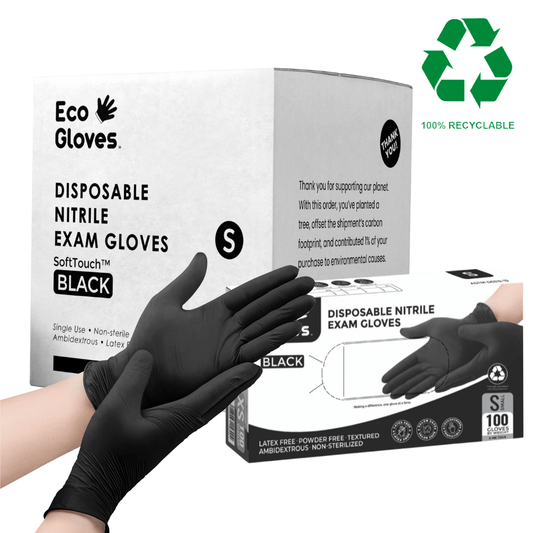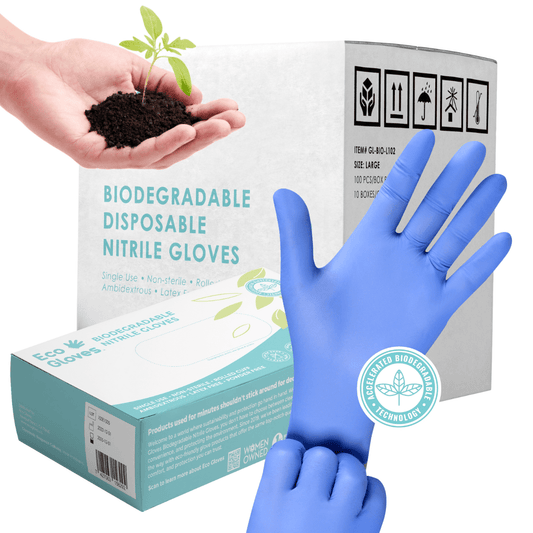Is there such thing as eco-friendly disposable gloves?
Eco Gloves

Eco-Friendly Alternatives: Sustainable Disposable Gloves
When it comes to eco-friendly alternatives for disposable gloves, several innovative options are emerging. These sustainable gloves are designed to minimize environmental impact and reduce waste. Here are some eco-friendly alternatives to traditional disposable gloves:
1. Biodegradable Gloves
Biodegradable gloves are made from materials that can decompose over time without leaving harmful residues. In most instances biodegradable gloves are enhanced with an organic compound that helps to speed up the biodegradation process of the gloves once it reaches a landfill, reducing the decomposition time from the 200+ years of traditional nitrile, to anywhere between 1-10 years, depending the on the brand and formulation. The great thing about biodegradable gloves is they provide the same level of protection, shelf life, and durability as conventional gloves while minimizing environmental harm.
2. Compostable Gloves
Compostable gloves are similar to biodegradable gloves but offer an additional advantage of being able to break down into compost at the end of its life. These gloves break down into organic matter after the composting process and can further become a renewable source to improve soil health, while also providing a solution to reducing waste. They are an excellent choice for industries that prioritize sustainability and have access to composting facilities.
3. Natural Latex Gloves
Natural latex gloves are a popular eco-friendly alternative to synthetic disposable gloves. They are made from the sap of rubber trees, making them a renewable and sustainable resource. Latex gloves are biodegradable and provide excellent protection against chemicals and contaminants. However, latex allergies is a common concern that many have to consider when opting to use latex gloves.
4. Chlorine-Free Gloves
Conventional disposable gloves are often treated with chlorine during the manufacturing process, which can have harmful effects on the environment. Chlorine-free gloves are manufactured without the use of chlorine, reducing the release of toxic substances into the environment. These gloves are a safer and more eco-friendly choice.
5. Plant-Based Gloves
Plant-based gloves are made from renewable resources, such as cornstarch or bamboo, instead of petroleum-based materials. These gloves have a lower environmental impact and are biodegradable. Plant-based gloves offer an excellent balance between functionality and sustainability.
6. Fair Trade Gloves
Fair trade gloves ensure that workers involved in the manufacturing process are treated fairly and receive fair compensation. These gloves promote social and environmental responsibility, ensuring ethical practices throughout the supply chain.
7. Reusable Gloves
Another sustainable alternative is reusable gloves, which can be used multiple times before disposal. These gloves are typically made from durable materials such as silicone, rubber, or fabric. By reducing the need for single-use gloves, reusable options significantly reduce waste generation.
8. Recyclable Gloves
Certain synthetic material gloves can be recycled if they are not contaminated by hazardous chemicals or other toxic substances. Recyclable gloves can be recycled through various programs and facilities. Recycling programs are available through waste management companies and local recycling centers. In many states and cities there are even private recycling businesses that have established recycling programs to specifically collect and recycle used gloves. While the cost to recycling uncommon recyclable goods can be high, it is an option that is possible and worth pursuing considering the environmental advantage and the contribution a circular economy.
Conclusion
The use of eco-friendly alternatives to traditional disposable gloves is a step towards a more sustainable and greener future. Biodegradable, compostable, recyclable, and reusable gloves offer environmentally responsible options that minimize waste and reduce pollution. By choosing these eco-friendly alternatives, we can protect our planet without compromising safety and protection. Make a conscious decision to opt for sustainable disposable gloves and contribute to a cleaner, healthier world.
Key Takeaways: Eating Food with Disposable Gloves
-
More Sanitary Than Bare Hands – Disposable gloves create a barrier against grease, germs, and dirt, reducing contamination while eating.
-
Convenient & Mess-Free – Gloves make clean-up easier, especially for messy meals like fried chicken, burgers, and tacos.
-
Eco-Friendly Options Exist – Eco Gloves are compostable and biodegradable, unlike standard gloves that contribute to landfill waste.
-
Individually Packaged for Hygiene – Single-use packets offer a clean, portable solution for eating on the go.
-
Trusted by Restaurants Worldwide – Used and tested at McDonald’s, KFC, Subway, and more for food handling and customer convenience.
👉 Upgrade your eating experience with Eco Gloves — the eco-friendly, food-safe disposable glove for cleaner, safer, and more enjoyable meals.
Frequently Asked Questions About Eating Food with Disposable Gloves
-
Why should I wear gloves when eating instead of washing my hands?
Even after washing, germs and grease can remain under nails and in skin creases. Gloves provide an extra layer of protection.
-
Are Eco Gloves safe for food contact?
Yes. Eco Gloves are certified for direct food contact and meet FDA standards for safety.
-
What makes Eco Gloves different from regular disposable gloves?
They’re compostable, biodegradable, and individually packaged for maximum hygiene and convenience.
-
Where are people using gloves to eat?
The trend is popular worldwide — from fried chicken in Asia to burgers in Europe — and is growing in the U.S.
-
Can I reuse disposable gloves for multiple meals?
No. Disposable gloves are single-use items and should be replaced after each eating session to maintain hygiene.
Further Reading
- What Makes Biodegradable Nitrile Gloves More Sustainable or Eco-Friendly?
- Biodegradable Disposable Gloves: A Step Towards Sustainability in Industrial Workplaces
- Eco-Friendly Beauty: The Rise of Biodegradable Gloves in Salons















